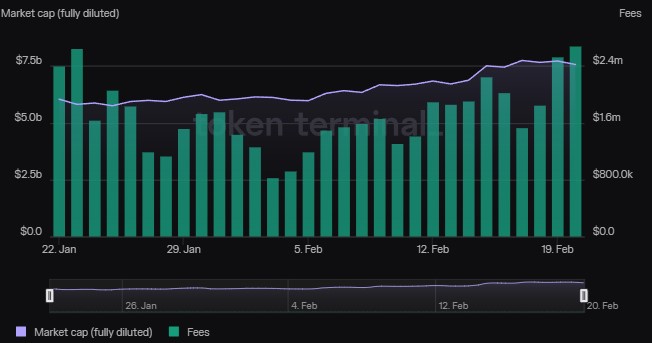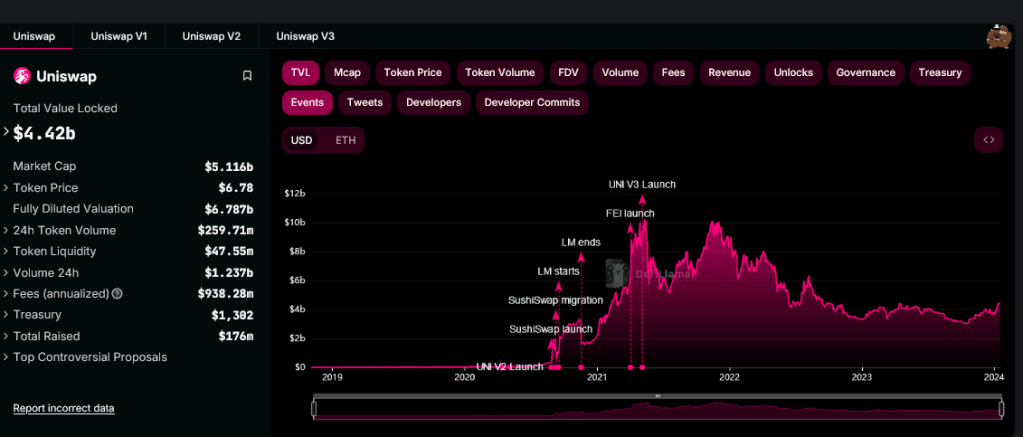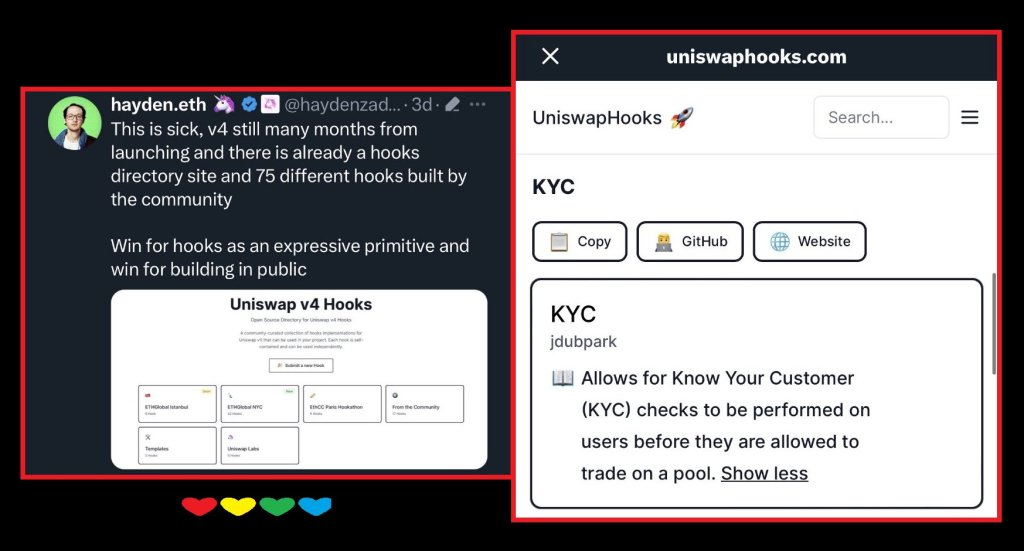Decentralized crypto exchange Uniswap received a notice from the U.S. Securities and Exchange Commission (SEC) that it intends to pursue an enforcement action, the company disclosed on Wednesday.
Uniswap Foundation Unveils Major Upgrade Plan, UNI Price Skyrockets 52%
Uniswap (UNI), one of the industry’s largest decentralized cryptocurrency exchanges (DEXs), has set the stage for a major shift in its ecosystem with a proposed upgrade that could have significant implications for UNI token holders.
The upgrade aims to bolster governance participation, enhance resilience, and reward token holders for active engagement within the Uniswap ecosystem.
Uniswap Takes Big Leap In Governance
Uniswap Foundation (UF) Lead Developer Erin Koen, while expressing his enthusiasm, has suggested that it has been the “biggest week in Uniswap Protocol Governance” and revealed a major upgrade proposal for the system.
At the heart of the proposed upgrade lies a fee mechanism designed to reward UNI token holders who stake and delegate their tokens. As announced, by actively participating in the governance process, token holders can earn additional rewards in the form of protocol fees.
In addition to the enhanced rewards, the proposed upgrade seeks to fortify Uniswap Governance, making it “more resilient and decentralized.”
According to Koen, by increasing the number of actively involved token holders, the governance structure becomes more robust, ensuring that decisions align with the collective interests of the UNI community.
The proposed upgrade maintains governance control over core parameters such as fee-charged pools and fee magnitude. Token holders will collectively decide on these critical aspects, allowing for flexibility and adaptability in response to market dynamics.
Beyond the immediate benefits, the proposed upgrade holds the potential for long-term value appreciation of the UNI token. By incentivizing participation and aligning token holders’ interests with the ecosystem’s success, Uniswap aims to foster organic growth and adoption.
Assuming a successful on-chain vote, the community will have the option to activate fees. Gauntlet, a trusted entity, is reportedly preparing a proposed roll-out process that will be shared on the forum.
Only after completing this separate governance process will fees be collected and distributed according to the adopted contracts. Koen further noted:
We’re excited to invigorate governance – incentivizing not only delegation but thoughtful and active delegation – by tying delegation to protocol fees. Specifically, we believe UNI token holders will be incentivized to choose delegates whose votes and engagement with the protocol will lead to the Protocol’s growth and success. If this proposal succeeds we believe we will see an influx of new delegations.
UNI Records 23-Month High
As these developments unfold, considerable excitement has emerged around the Uniswap protocol. Notably, a cryptocurrency investor named “Virtual Bacon” expressed enthusiasm, stating, “Uniswap finally proposes to share revenue with UNI token stakers. Chart exploding on this ‘proposal’ which hasn’t passed yet.”
Within 24 hours, the UNI token witnessed a surge of over 52%, signaling the market’s anticipation of the potential benefits this upgrade could offer token holders.
Currently, the UNI token is trading at $11.29. However, with the unveiling of the upgrade proposal, the token quickly surged to the $12.50 level, reaching its highest point in 23 months.
The gains over longer time frames have also experienced a dramatic surge. Over the past fourteen days, the UNI token has seen an impressive increase of 73%. Similarly, the token’s value has soared by 94% in the last thirty days.
Overall, should the proposed upgrade be approved and implemented, Uniswap will reinforce its position as a leading DEX and establish a framework that empowers token holders and fosters the continued growth and success of the Uniswap protocol.
Featured image from Shutterstock, chart from TradingView.com
Uniswap Expands Reach: Deploys v2 Protocol On Six New Chains Including Arbitrum And Polygon
Uniswap (UNI), one of the largest decentralized cryptocurrency exchanges (DEX) by trading volume, has made an important announcement regarding deploying its v2 protocol on six additional chains.
The chains on which the v2 protocol has been deployed include Arbitrum (ARB), Polygon (MATIC), Optimism (OP), Base, Binance Smart Chain (BSC), and Avalanche (AVAX).
Uniswap Widens v2 Protocol Deployment
According to a recent post on X (formerly Twitter) by Uniswap Labs, the software product developer working on the protocol, the decision to deploy the v2 protocol on more chains is primarily driven by the desire to simplify the experience for Liquidity Providers (LPs).
While the protocol’s v3 offers advanced features tailored for active liquidity providers, the development team believes the v2 protocol offers a more “straightforward approach.”
By default, v2 pools cover the entire price range, reducing the need for upfront decisions and minimizing the active involvement of liquidity providers. This simplification streamlines the process and makes it more accessible to a broader range of users, according to the announcement.
Another benefit of using the v2 protocol on multiple chains, according to Uniswap Labs, is its cost efficiency. Creating pools on v2 is more gas efficient than other versions, resulting in lower gas costs to add liquidity.
This cost reduction can be translated into savings for users, making swaps on the platform “incredibly affordable.” In addition, the use of v2 on Layer 2 scaling solutions significantly reduces the risk of frontrunning and manipulative practices known as Miner Extractable Value (MEV).
Ultimately, by offering an official v2 deployment directly accessible through the Uniswap interface, the developers suggest that users can be assured of a safe and secure environment for their swaps.
UNI Price Dip, Platform Metrics Remain Solid
Despite the recent developments that could attract investors’ attention and drive broader adoption of the Uniswap protocol, the exchange’s native token, UNI, is currently undergoing a significant correction in line with the overall market trend.
Currently, UNI is trading at $7.22, representing a 4.4% price drop in the past 24 hours and a 1.1% decline in the last trading hour. However, it’s worth noting that UNI has been one of the better-performing tokens in the market, with price increases of 14.7% and 16.8% in the past fourteen and thirty days, respectively.
Furthermore, according to data from Token Terminal, the Uniswap ecosystem continues to exhibit substantial growth in key metrics.
The fully diluted market capitalization of Uniswap stands at $7.56 billion, reflecting the total value of all tokens if they were fully in circulation. This figure has experienced a notable increase of 18.4% over the past month.
In contrast, the circulating market capitalization, which considers the currently circulating tokens, is valued at $6.94 billion, indicating a 19.9% increase over the same period.

Despite the overall surge in market capitalization, the trading volume of the UNI token has experienced a significant decline of 69.3% over the past 30 days, amounting to $2.79 billion.
The total value locked (TVL), a measure of the value of assets locked within Uniswap’s smart contracts, has also experienced a 14.4% increase, reaching $4.76 billion.
Featured image from Shutterstock, chart from TradingView.com
Uniswap Unveils New Security Feature: Will It Boost UNI Demand?
Uniswap Labs, the developer of Uniswap–a decentralized exchange, has introduced a new security feature called Permit2. Taking to X on January 18, the DEX developer said this update addresses the “infinite token allowances” vulnerability that hackers can exploit. This flaw risked user funds, and the new feature is meant to resolve this concern.
Uniswap Sealing Infinite Token Allowance Risks
In crypto, especially among decentralized finance (DeFi) protocols, the “token allowance” is permission initiated by the user granting smart contracts access to tokens. From there, assets can be moved.
With this permission, it becomes possible for users to interact with dapps, chiefly protocols that utilize user funds. Some of these dapps include, for instance, decentralized exchanges like Uniswap or lending platforms like Aave or Maker.
While useful, “token allowance” can be exploited by hackers via “infinite token allowance,” where hackers can infinitely access and illegally withdraw funds from wallets, draining them as a result. Once a wallet has been compromised, it can be drained without the user’s knowledge since the compromised code already permits the hacker to move funds.
Aware of this risk, Uniswap Labs is introducing the open-source Permit2 as a solution. The tool, the DEX developer says, will give users more protection and, more importantly, control over digital assets.
A key feature of Permit2 is that users can set time limits on token approvals. Third parties can only access funds within a specific period in this arrangement.
Additionally, the tool introduces a reusable token approval for simplicity. With this feature, end users don’t have to repeatedly grant access to their funds for each transaction. On the gas-saving fronts, Uniswap Labs say Permit2 also utilizes signature-based approvals and transfers. This means the tool can reduce gas fees when users transfer tokens.
Uniswap Building, UNI Remains Under Pressure
This enhancement precedes the upcoming release of Uniswap v4, which introduces Hooks. This new feature provides developers with more flexibility and control over their applications.
Analysts say the launch of Uniswap v4 and Uniswap Labs’ continuous enhancement to improve security might cement the DEX’s position.

According to DeFiLlama data, Uniswap has managed over $4.4 billion worth of assets. Even so, UNI prices continue to struggle.
Looking at the daily chart, UNI has resistance at around $8.1 and is currently down roughly 20% from December highs. Sharp losses below $6 might trigger a sell-off, forcing the token towards $4.5 or lower.
Institutional Crypto Trading Platform Talos Taps Into Uniswap’s Liquidity
It’s the first time Talos will be routing trades through a decentralized exchange.
Uniswap V4 Expected To Be Huge, But Is This Requirement A Dealbreaker?
Due to its innovation, Uniswap Labs plans to introduce Hooks in the upcoming Uniswap v4, putting the world’s leading decentralized exchange in the spotlight. According to a critic on social media platform X, the DEX is on the know-your-customer (KYC)-verification route once Hooks on Uniswap v4 are released.

Uniswap v4 Hooks Is The Beginning Of Censorship?
Sharing screenshots, the user shared insights and said the exchange brings KYC verifications on the latest iteration. At the same time, the platform plans to use the “permission required” off-chain server on UniswapX for performance enhancements.
UniswapX is an open-source solution allowing permissionless and open trading across Automated Market Makers (AMMs) and other liquidity sources. It is currently being tested on the Ethereum mainnet.
Though the community has embraced these developments, the critic said these requirements, especially the identity verification requirement on Hooks, will be available as an option before being gradually made mandatory down the line.
Uniswap v4 is being developed, and Hooks will be one of the key updates. Hooks are programmable extensions for customizing pool and trade behavior, tightly integrated with Uniswap’s core protocol.
With Hooks, it becomes easier for developers to implement other features such as dynamic fees, on-chain limit orders, and overly improved customization. In this way, it will also be possible to integrate Uniswap v4 into other protocols.
Uniswap Evolution: Building “Real” DeFi?
The DEX has constantly evolved and released new features since the first version went live in late 2018. Uniswap v1 introduced AMM, opening up decentralized finance (DeFi). This allowed liquidity providers (LPs) to be crucial to market making.
In Uniswap v3, the exchange released concentrated liquidity (CL). This feature allows LPs to specify a price range within which they are willing to provide liquidity. In Uniswap v2, LPs provided liquidity across the entire price range of the token pair. In v3, liquidity depth increases while traders get better pricing.
Despite the criticism, Hooks has been supported in some quarters. For instance, the user acknowledged that the feature would amplify the value proposition of some protocols, making them real “DeFi” platforms. At the same time, while responding to the critic, another commentator said the feature will do more than what anybody else has done for “real DeFi.”
Uniswap Labs to Charge 0.15% Fee on Crypto Swaps Involving ETH, USDC, Other Tokens
The entity behind popular DeFi exchange Uniswap will levy a small fee – the first in its history.
Weekend Wrap: Uniswap dev sacked for alleged rug, Steadefi hacker goes mixing and more

Uniswap developer AzFlin has admitted to creating the FRENS token but has argued what he did doesn’t constitute a rug pull.
Uniswap Labs Releases Its Plan for Uniswap v4, Invites Community Feedback
The biggest decentralized crypto exchange is opening its development process to the public for the first time as the SEC cracks down on its centralized competitors.
Crypto Long & Short: Why Layer 2 Protocols Matter
This week, Glenn Williams Jr. tackles one of the core bits of infrastructure that anyone in the hunt for crypto investments must grasp. Then, Todd Groth of CoinDesk Indices wades into one of traditional finance’s biggest numbers: $7 trillion.
